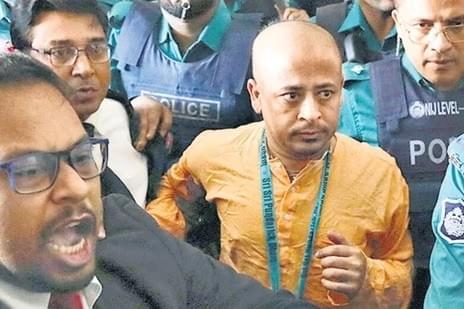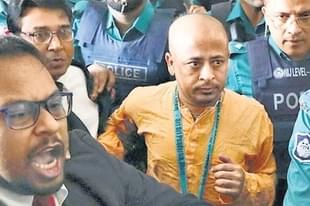World
Proscribing ISKCON: Bangladesh HC Lobs Ball Into Yunus’ Court, All Eyes Now On Interim Government
Jaideep Mazumdar
Nov 28, 2024, 07:18 PM | Updated Nov 29, 2024, 03:37 PM IST
Save & read from anywhere!
Bookmark stories for easy access on any device or the Swarajya app.


The hopes of the Islamist interim government of Bangladesh headed by Mohammad Yunus to get the Bangladesh High Court to impose a ban on the International Society For Krishna Consciousness (ISKCON) have been dashed.
The Court lobbed the contentious ball to the government’s court Thursday (November 28), asking it to take a ‘final call’ on the issue of taking action against the Hindu Vaishnavite order.
A two-member bench of the Court comprising Justices Farah Mahbub and Debasish Roy Chowdhury declined to pass any order on a petition by lawyer Mohammad Monir Uddin asking for a ban on ISKCON.
The petitioner is learnt to be close to some prominent figures in the Yunus administration and it is widely believed that the petition he filed seeking a ban on ISKCON had the Yunus administration's blessings.
The petition was accepted Wednesday (November 27). The petitioner presented newspaper reports on the arrest of ISKCON monk Chinmoy Krishna Das on sedition charges and the subsequent violence in Chittagong after a court there turned down his bail plea and ordered his incarceration.
The petitioner also drew the court’s attention to the murder of an assistant public prosecutor, Saiful Islam Alif and contended that ISKCON supporters were behind the murder.
The HC bench, while admitting the petition, asked the Attorney General, Mohammad Assaduzzaman, to provide information on the steps being taken by the interim government on the ISKCON issue.
“The concerns raised by the petitioner represent the sentiments of 180 million people of Bangladesh. This (the lawyer’s murder) is a regrettable incident, a criminal offense, and the government is treating it seriously with plans for appropriate legal action,” Assaduzzaman, who speaks the language of the Islamists, told the court.
But the attorney general, who had recently said that a Constitutional amendment making Bangladesh a secular nation should be annulled, stopped short of backing the petitioner’s demand.
“We must consider the constitutional implications before taking any decision. That is why I believe it (the call to ban ISKCON) is premature. Let us see how the government addresses this issue,” he said Wednesday.
Thursday saw attorney general Assaduzzaman’s juniors--additional attorney general Aneek R Haque and Deputy Attorney General Md Asad Uddin--informing the court of the steps taken by the government. They said that three cases have been filed in the murder of the Chittagong lawyer and 33 people have been arrested.
The two government lawyers said that necessary measures are being taken to control the unrest arising out of the arrest of the ISKCON monk and the murder of the lawyer in Chittagong.
The High Court, while rejecting the petition, expressed the hope that the government would remain cautious about protecting law and order and the lives and properties of the people of Bangladesh.
The Court also left it to the Yunus government to take a final call on the issue of ban on ISKCON.
This has put the Yunus administration in a delicate spot. Though it would love to ban the ISKCON, it is also mindful of the backlash such a step would invite from within the country as well as India and other countries.
Though attorney general Assaduzzaman termed the ISKCON a “religious fundamentalist organisation”--a view that reflects that of Yunus and the other Islamists in his administration--the government wanted the Court to order the ban.
The Yunus administration will now come under intense pressure from the country’s Islamists, both within and outside his administration--to ban the ISKCON.
A number of Islamist parties and organisations held a press meet at the National Press Club Thursday demanding that the government declare ISKCON a “terrorist organisation” and impose a ban on it.
A number of other colleagues of Yunus, including leaders of the students’ movement which overthrew Sheikh Hasina, have backed the demand for a ban on ISKCON.
But Yunus is well aware that imposing a ban on ISKCON would also portray his administration as anti-minority and would invite global opprobrium. More so since ISKCON is well-respected across the globe and has branches in many countries, including western nations.
A number of prominent people in western nations are ISKCON devotees. A ban on ISKCON will trigger outrage and condemnation in many countries and will besmirch the image of Bangladesh’s interim government as well as that of the country itself.
However, nothing will please the Islamists in Bangladesh more than a ban on ISKCON. Yunus, as is well-known, is an Islamist and has given a free rein to Islamists after taking charge of the interim government in the country.
The Islamists, who were kept on a tight lease by Sheikh Hasina, now wield a lot of power and influence in Bangladesh. Yunus has also set free prominent operatives of Islamist terror outfits who had been jailed by Hasina.
Having let the Islamist genie out of the bottle, Yunus will find it extremely difficult to go against the wishes of Bangladesh’s mullahs now.
Also read: Bangladesh may be moving towards appeasing its Islamic fundamentalists by banning ISKCON




